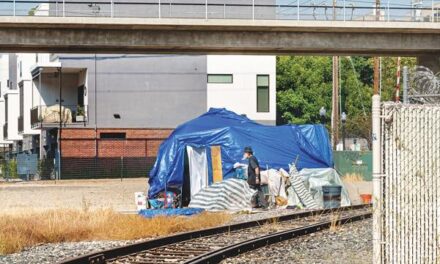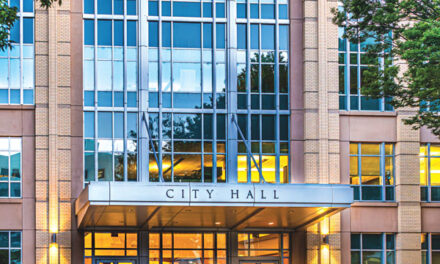I was walking on Ninth Street near City Hall and passed a tiny homeless encampment burrowed into the porch of a vacant building. Empty wine bottles stood sentry around two people asleep. Garbage spilled across the sidewalk. The little hovel was sad and filthy and carried a stomach-churning stench.
The scene triggered a memory. It made me think about a documentary film I saw two decades ago, “The Marshes of Two Street,” by Richard Simpson.
“Marshes” is a profound statement about homelessness in Sacramento—the most eloquent statement I’ve ever seen, far more coherent and sensible than anything from City Hall. I wanted to track down the movie and watch it again.
Simpson made “Marshes” in 1966. He carried his 16-millimeter camera, tripod and microphone into Old Sacramento, known as the West End, and focused on the rummies, barflies, derelicts, bums, tramps and vagrants who existed there. Simpson hung around the West End for weeks. He built trust.
The idea was to give voice to forgotten people whose world was wiped out by redevelopment. In the background of many scenes, support scaffolds are visible under the new Interstate 5. The freeway delivered the birth of Old Sac and death of a skid row filled with hundreds of homeless people.
I learned Simpson died in 2019 after a long struggle with dementia. I found his wife, Roxanne O’Brien, a chef and retired professor at American River College. She was nice enough to send me a DVD copy of “The Marshes of Two Street.”
Sure enough, the film was as brilliant as I remembered—even better with age. It’s more relevant today than when it was shown on KVIE Channel 6 more than 65 years ago.
Simpson was a poet. The film’s introduction equates Second Street to a river. Bums who lay in the gutter are marshes that line the riverbank. The black and white cinematography uses brutal close-ups that emphasize glassy eyes, absent teeth, flattened noses and pockmarked faces.
“Somebody will tell you, ‘My wife, she’s the cause that I’m down here, or my mother died.’ Everybody has a reason,” one man says. “This is just an escape, an escape from a man’s weaknesses.”
Another says, “Now then, I don’t have to worry about nothing, not no more. I have to live a cheap life, but I can live it the way I like.”
Simpson doesn’t identify anyone. He films people on doorsteps and street corners and in bars and rooming houses—Hotel Enterprise, Union Gospel Mission, Roma Café, Bank Exchange Café, Timber Club, Channel Restaurant.
People on Two Street are ravaged and broken and proud and articulate. One man reads a poem. Another sings. One recites a prayer. A man explains the word “empathy.”
A puffy-faced woman sits on a barstool sipping a beer, her hair pulled back with bangs over her forehead. She talks about never wanting to be alone, about sleeping with women and men, about alcoholism. “I found out on skid row that nothing was expected of me,” she says.
Several men describe the dangers of Two Street, muggings and beatings, sometimes by police. “The police are servants, and that’s what they should understand they are,” one says.
Jobs are a major theme. “We have to find out somehow how to give jobs to these poor guys, tramps if you want to say so,” a man says. Another insists, “The majority of the people want jobs—jobs, that’s what they want.” And another: “Look at me, a Black man, I can’t get a goddamned job.”
Watching “Marshes” made me think about the absurdity of the city’s approach to homelessness. Mayor Darrell Steinberg and his colleagues portray homelessness as something new and baffling. In fact, it’s been part of the city since 1848.
The city didn’t allow tents in 1966. Bums slept in flop houses or fields or West End sidewalks. More than anything, they wanted jobs.
Today, you can’t mention jobs—the idea of homeless people working is inconceivable. Today we treat homeless as wayward children. The men and women of Two Street would hear that and laugh.
R.E. Graswich can be reached at regraswich@iclould.com. Follow us on Facebook, Twitter and Instagram: @insidesacramento.
















